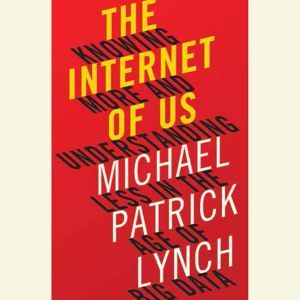

The Internet of Us
Knowing More and Understanding Less in the Age of Big Data
Author: Michael P. Lynch
Narrator: Dan Woren
Unabridged: 6 hr 31 min
Format: Digital Audiobook Download
Publisher: Random House Audio
Published: 03/21/2016
Synopsis
We used to say "seeing is believing"; now googling is believing. With 24/7 access to nearly all of the world's information at our fingertips, we no longer trek to the library or the encyclopedia shelf in search of answers. We just open our browsers, type in a few keywords and wait for the information to come to us. Indeed, the Internet has revolutionized the way we learn and know, as well as how we interact with each other. And yet this explosion of technological innovation has also produced a curious paradox: even as we know more, we seem to understand less. While a wealth of literature has been devoted to life with the Internet, the deep philosophical implications of this seismic shift have not been properly explored until now. Demonstrating that knowledge based on reason plays an essential role in society and that there is much more to “knowing” than just acquiring information, leading philosopher Michael Patrick Lynch shows how our digital way of life makes us overvalue some ways of processing information over others, and thus risks distorting what it means to be human. With far-reaching implications, Lynch's argument charts a path from Plato's cave to Shannon's mathematical theory of information to Google Glass, illustrating that technology itself isn't the problem, nor is it the solution. Instead, it will be the way in which we adapt our minds to these new tools that will ultimately decide whether or not the "Internet of Things"—all those gadgets on our wrists, in our pockets and on our laps—will be a net gain for humanity. Along the way, Lynch uses a philosopher's lens to examine some of the most urgent issues facing digital life today, including how social media is revolutionizing the way we think about privacy; why a greater reliance on Wikipedia and Google doesn't necessarily make knowledge "more democratic"; and the perils of using "big data" alone to predict cultural trends. Promising to modernize our understanding of what it means to be human in the digital age, The Internet of Us builds on previous works by Nicholas Carr, James Gleick and Jaron Lanier to give us a necessary guide on how to navigate the philosophical quagmire that is the Information Age.

